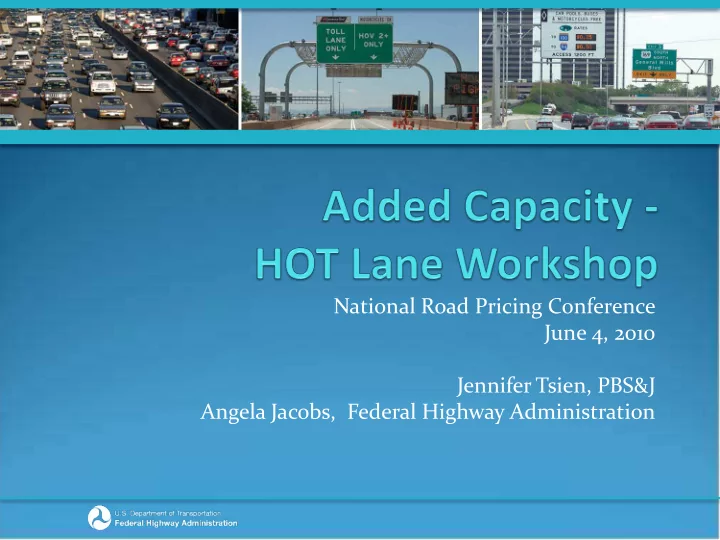

National Road Pricing Conference June 4, 2010 Jennifer Tsien, PBS&J Angela Jacobs, Federal Highway Administration
Workshop Purpose Provide hands-on practice in applying lessons learned and best practice from implemented projects across the country Understand the challenges in implementing pricing projects Move pricing forward in your area
Workshop Agenda Review of Project Break into groups for exercises Five subject areas covered 5-10 minute overview of subject area 20-25 minutes to complete exercise Break for lunch after second round of exercises Group reports
Subject Areas Planning Operations Design Funding and Finance Outreach No specific order, all have overlapping elements
Our Project Length: 15 miles 6 lanes with full shoulders 165,000 AADT and growing Peak period speeds as low as 30 mph Competing Facilities Arterial servers suburban community at the end of the study corridor Nearby radial freeway to be expanded in the near future Transit Facilities Serves entire corridor 2 Park and Ride lots
Suburban Community Population 20,000 Suburban Community $75k median income Transit Service Population 40,000 20% minorities $40k median income 1.9 autos per household 40% minorities Peak TT: Peak TT: 1.3 autos per household 15-20 min 25-30 min Competing Radial Freeway Freeway Travel Time Currently 4 lanes, to Downtown Park and very congested, to Ride GPL Peak: 20-30 min Freeway Travel Time to Park and be expanded to Downtown Ride 6 lanes in the GPL Peak: 12-16 min future Radial Freeway 6 lanes Length: 15 miles Competing Arterial 165,000 AADT Length: 20 miles Peak TT: 25-45 min Downtown Employment Total Travelshed Population: 200,000 $50k median income 30% minorities 1.5 autos per household
Project Characteristics Corridor History Congestion worsening Downtown businesses seeking alternatives to bring more commuters downtown Opposition to capacity improvements on adjacent radial corridor from environmental interests Corridor demographics Varies by sub-area Total travelshed population = 200,000 $50,000 median income 30% minorities 1.5 autos per household
Project Characteristics Traffic Volume by time-of-day General Purpose 12,000 Lanes 10,000 Vehicles per hour 6 lanes with 10’ 8,000 shoulders 6,000 165,000 AADT 4,000 2,000 and growing 0 12:00 AM 2:00 AM 4:00 AM 6:00 AM 8:00 AM 10:00 AM 12:00 PM 2:00 PM 4:00 PM 6:00 PM 8:00 PM 10:00 PM
Project Characteristics Project Partners State DOT Owner of lanes and ROW Operator of freeway Transit authority Operator of express bus service and park-and-ride facilities Regional toll authority Operates one toll road in region Cash and transponder-based electronic tolling Metropolitan Planning Organization
Project Characteristics Legal authority – HOT and express allowed by state statute Regional policies – No policies on toll rate setting, occupancy, etc. Project partners – state DOT (owner of ROW), transit authority, regional toll authority, state police Toll authority currently operating one toll road in region with ETC (transponder) and cash Environmental clearance – FONSI expected
Project Characteristics Cross section Total right of way available: 200 feet Access Location and method of access undetermined Enforcement Subject to design and location
Project Characteristics Estimated project costs Capital costs: $ 50,000,000 Annual operating costs: $ 1,000,000 Available funding State is committed to contributing $ 28,000,000 Traffic and revenue studies - none Revenue sharing potential – Regional toll authority, private partner Possible funding partners - Regional toll authority, private partner
Planning Establish goals and objectives and clearly communicate a vision Take advantage of opportunities Maintain flexibility Engage project partners and encourage agency cooperation
Planning Exercise
Operations Develop a Concept of Operations to guide the process Establish Operational Policy Leverage technology and operational strategies Implement and maintain stakeholder group Identify design and legislative impacts of operational goals Enforcement strategies
Operations Exercise
Design Identify user groups for the HOT lanes Provide safe and efficient design Provide enforcement areas Communicate to the public at the roadside
Design Exercise
Funding and Finance Consider any and all funding and/or financing mechanisms Available assistance through federal programs Stakeholders Revenue sharing
Finance Exercise
Outreach Identify project champions Conduct market research and identify issues Develop clear and concise messages Communicate project goals Continue from project development through operations Create brand awareness
Outreach Exercise
Breakout Group Reports
Recommend
More recommend